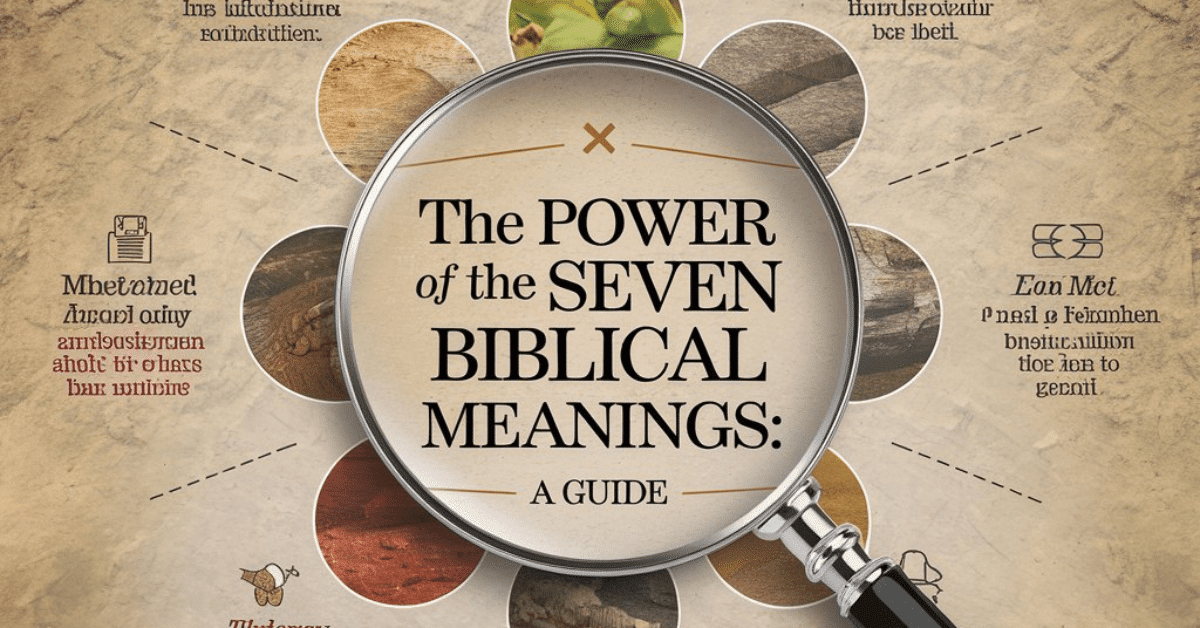The Bible is a rich tapestry of stories, teachings, and wisdom that offers profound insights into the human experience. One intriguing aspect of biblical texts is the symbolism and meanings behind certain numbers, particularly the biblical meaning of seven, which holds significant importance. The number seven represents completion, divine perfection, and spiritual awakening. This article delves into the seven biblical meanings, revealing their significance and application in our lives. Whether you’re seeking spiritual guidance or simply wish to deepen your understanding of scripture, this guide will provide valuable insights into the power of the seven biblical meanings.
The Creation of the World
The biblical significance of the number seven begins with the creation narrative in Genesis. God created the world in six days and rested on the seventh, marking it as a day of completion and holiness (Genesis 2:2-3). This establishes the principle of rest and divine perfection. The act of resting on the seventh day, known as the Sabbath, serves as a reminder of the importance of rest and reflection in our lives. The seven biblical meanings encapsulate not just the act of creation but also the need for balance between work and rest, emphasizing the spiritual significance of taking time to recharge and connect with God. Understanding this biblical numerology encourages us to seek harmony in our lives.

The Seven Churches of Revelation
In the New Testament, the book of Revelation mentions the seven churches (Revelation 1:11). These churches represent different aspects of the Christian faith and the challenges faced by believers. Each church received a message from Jesus, highlighting their strengths and areas for improvement. The seven biblical meanings in this context emphasize the importance of community, accountability, and spiritual growth. They encourage believers to assess their spiritual journeys, seek fellowship, and remain steadfast in their faith, reminding us that we are not alone in our struggles. This aspect reflects the angelic guidance that can help us navigate our spiritual paths.
Seven Sacraments
In many Christian traditions, the seven sacraments hold profound significance. These sacraments: baptism, confirmation, Eucharist, penance, anointing of the sick, holy orders, and matrimony serve as channels of grace and spiritual nourishment. Each sacrament reflects the seven biblical meanings associated with initiation, healing, and community. They provide believers with a tangible way to experience God’s presence and grace in their lives, reinforcing the importance of sacramental life in fostering a deeper connection with God and the Church. The symbolism of these sacraments enhances our understanding of angelic messages and the divine plan for our lives.
Seven Deadly Sins and Virtues
The concept of the seven deadly sins (pride, greed, wrath, envy, lust, gluttony, and sloth) and their corresponding virtues serve as a moral guide for Christians. This framework highlights the struggles we face in our spiritual journeys and the virtues we should strive to cultivate. The seven biblical meanings related to these sins and virtues remind us of the need for self-examination, repentance, and personal growth. They encourage believers to cultivate virtues such as humility, generosity, patience, kindness, chastity, temperance, and diligence, guiding us toward a more righteous and fulfilling life. This moral guidance is deeply rooted in biblical traditions, reflecting the spiritual significance of our actions.

The Seven Seals of Revelation
In the book of Revelation, the seven seals represent divine judgment and the unfolding of God’s plan for humanity (Revelation 6). Each seal unveils significant events that lead to the end times. The seven biblical meanings in this context emphasize the themes of hope, perseverance, and faith in the face of adversity. They remind believers that God is ultimately in control and that His plan will prevail. The imagery of the seven seals invites us to reflect on our own lives and the trials we encounter, encouraging us to trust in God’s providence and remain steadfast in our faith. Recognizing these events through biblical symbolism can enhance our spiritual interpretation of life’s challenges.
The Seven Last Words of Christ
During His crucifixion, Jesus spoke seven last words, each carrying profound meaning (Luke 23:34; John 19:26-27; Matthew 27:46; John 19:28; John 19:30; Luke 23:46). These utterances encompass themes of forgiveness, compassion, fulfillment, and surrender. The seven biblical meanings derived from these words offer insights into Christ’s sacrifice and the depth of His love for humanity. They challenge believers to embody these principles in their lives, promoting forgiveness, love, and selflessness. The last words of Christ serve as a guide for how we should live our lives by His teachings, reflecting our divine purpose.
The Seven Spirits of God
In the book of Revelation, the seven spirits of God symbolize the fullness of the Holy Spirit (Revelation 4:5). These spirits represent wisdom, understanding, counsel, might, knowledge, fear of the Lord, and the spirit of the Lord. The seven biblical meanings in this context highlight the transformative power of the Holy Spirit in the lives of believers. They remind us of the importance of seeking wisdom and guidance from the Holy Spirit as we navigate our spiritual journeys. Embracing these attributes can lead to a more profound relationship with God and a greater understanding of His will for our lives, fostering our spiritual awakening.

FAQs
What is the significance of the number seven in the Bible?
The number seven symbolizes divine perfection, completion, and rest. It appears throughout the Bible, representing God’s creative order and His covenant with humanity.
How do the seven biblical meanings apply to daily life?
The seven biblical meanings encourage reflection on spiritual growth, community, moral guidance, and reliance on God’s grace. They offer insights into how to navigate challenges and cultivate a fulfilling spiritual life.
What are the seven deadly sins and their virtues?
The seven deadly sins are pride, greed, wrath, envy, lust, gluttony, and sloth. Their corresponding virtues are humility, generosity, patience, kindness, chastity, temperance, and diligence.
How can I apply the teachings of the seven last words of Christ in my life?
Embodying forgiveness, love, and selflessness, as reflected in Jesus’ last words, can lead to a more compassionate and fulfilling life, aligning with His teachings and example.
What are the seven spirits of God?
The seven spirits of God represent the fullness of the Holy Spirit and include wisdom, understanding, counsel, might, knowledge, fear of the Lord, and the spirit of the Lord.
Why is the number seven significant in biblical texts?
The number seven represents divine perfection, completion, and rest, appearing throughout the Bible in various contexts to symbolize God’s work and covenant with humanity.
How can understanding the seven biblical meanings enhance spiritual growth?
Exploring the seven biblical meanings provides insights into faith, morality, and community, encouraging believers to reflect on their spiritual journeys and deepen their relationship with God.
Are there practical applications of the seven last words of Christ?
Yes, the teachings from the seven last words of Christ inspire believers to practice forgiveness, love, and selflessness in their daily interactions and relationships.
What do the seven churches in Revelation teach us?
The seven churches illustrate various challenges and strengths within the Christian faith, offering valuable lessons on perseverance, accountability, and spiritual growth.
How can the seven sacraments impact a believer’s spiritual life?
The seven sacraments serve as vital means of grace, helping believers experience God’s presence and fostering a deeper connection to the Church and their faith.
What are the implications of the seven spirits of God?
The seven spirits of God represent the fullness of the Holy Spirit, guiding believers to seek wisdom, understanding, and empowerment in their spiritual walk.
Conclusion
The power of the seven biblical meanings reveals a profound understanding of our spiritual journeys and the divine principles guiding our lives. From the creation narrative to the seven spirits of God, these meanings offer insights into completion, community, moral guidance, and divine love. By embracing the wisdom encapsulated in these teachings, believers can deepen their faith, foster spiritual growth, and cultivate a life that reflects the principles of the gospel. As you explore these meanings, may you find inspiration and guidance in your spiritual journey.

